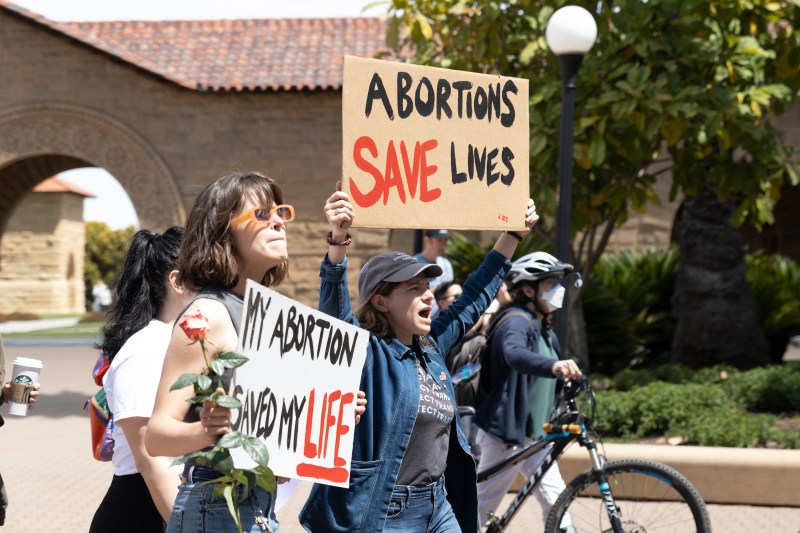When the Supreme Court ruled to overturn the nearly 50-year-old right to abortion in June, it set off choruses of protest across the country. Now, nearly three months later, Stanford professors and student organizers are refusing to put down the megaphone. As abortion trigger bans have set in across the country in the wake of the June 24 decision, community members are doing what they can to maintain hope as they advocate to protect legal access to abortion across the United States.
Stanford legal experts have expressed a multitude of fears about the legal ramifications of the decision. The Court justified its ruling based on the fact that there is no mention of abortion in the Constitution, according to law and health professor Michelle Mello ’93, an argument that many have worried could prove ruinous for a variety of other rights. Mello is specifically concerned about the future of other freedoms that are not explicitly outlined in the Constitution, like the rights to contraceptives and gay marriage.
The Court’s reasoning would “support the overturn of a lot of other rights of long-standing recognition” which emerged through judicial recognitions, Mello said.
California is one of 21 states that legally protects abortion rights. According to Stanford Young Democratic Socialists of America (YDSA) financial officer Nahian Haque ’25 and Stanford Women in Law (SWIL) financial officer Sophia Lamas ’24, abortion is increasingly becoming a privilege only available to people who live in these states or can travel to one of them for the procedure.
“I’m a Texas native. The area I grew up in was home primarily to lower-income people of color, who of course, are disproportionately affected by the state’s restrictive laws,” Haque wrote.
Haque emphasized how housing and reproductive rights are interconnected: “I’m lucky enough to live in California now, but not everyone has the opportunity to move here. The Bay Area is known for its insanely high cost of living.”
Lamas, whose family is low-income, Christian and of Mexican descent, said she is lucky to live in Colorado, another state where abortion is legal, and have a family that supports abortion rights.
“Affording safe medical care or traveling to another state is not feasible for many low-income women,” Lamas wrote. “When you put stereotypes, cultural taboos and racism into the mix, it becomes even more difficult.”
Stanford student leaders intend to utilize their organizations’ resources to respond to the ruling. YDSA Co-President Danny Sallis ’25 described feeling an urgency to organize for abortion rights following the decision. Sallis wrote that he was frustrated with people who “had the power to do something, and are now capitalizing off the decision instead in their campaigns,” in a statement to The Daily.
Sallis wrote that the YDSA will organize, support other organizers and participate in mutual aid efforts. “Governments have shown that they can’t be trusted to save anybody,” Sallis wrote. “Anybody with the means to participate in mutual aid can help a lot in this way.”
Similarly, SWIL members have participated in protests and will continue to seek ways to support people impacted by the ruling, Lamas wrote.
According to Mello, the ruling reflects the success of decades-long, smart and well-moneyed interests dedicated to one issue. It also signals the Trump administration’s legacy: “Nothing is as lasting as the appointment of very conservative judges and justices who will be on the bench for decades to come,” Mello said.
Sallis wrote that the uncertain future created by the Supreme Court’s elimination of widespread abortion access has led him to question current power structures in the United States.
“One thing that it tells us is that the structure of the federal government has to change,” Sallis wrote. “Once six people with aligning views were in a position of power, they decided what human rights are afforded to millions, against public opinion.”
Echoing Sallis, Haque said the Court’s decision demonstrates the harms of the concentration of power in the hands of a “vocal minority.”
“As a woman of color and a member of the FLI community at Stanford, I’ll just say that I’m sick and tired of men trying to make decisions about things they could never understand,” Haque wrote.
“The actions of a few can, and have, deeply wounded our country,” Lamas said. “At the same time, I can’t lose hope,” she said.
According to Lamas, many SWIL members protested over the summer and will continue to donate their time to people affected by the reversal of Roe v. Wade. “This issue will be high on our list as we come into the new school year,” she said.
